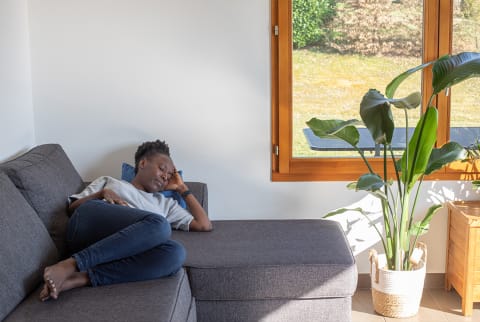Advertisement
This Is The Biggest Barrier To Sleep If You're 60+, Study Finds


Existing research has shown that as we get older, our sleep tends to suffer. And according to a study out of Finland, published in the Journal of Occupational & Environmental Medicine, there's one thing that a lot of adults in their 60s seem to be losing sleep over: Stress.
Studying how stress affects sleep in older adults
For this study, researchers wanted to assess how different kinds of stress affected the sleep of older adults who were approaching retirement. The first study consisted of over 2,700 adults and looked at factors like physical and mental working conditions, stressful life events, and work-life balance.
An additional population study of nearly 4,000 people found that over half of Finnish men in their 60s and 70% of women had reported sleeping difficulties within the past month.
Taking the results of both studies, the researchers were able to distinguish four factors or components associated with stress: physical workload and shift work, psychosocial workload, social and environmental nonwork adversity, and life event and/or health-related nonwork adversity.
As professor of psychology and study co-author, Marianna Virtanen, Ph.D., explains in a news release, "The more an employee had work and nonwork stressors, the more problems they also had with sleep."
The researchers also note that different kinds of stress affect sleep in different ways.
Work-related stress, for instance, was linked to ongoing sleep problems, whereas non-work-related stress predicted more sleep problems moving forward. Working conditions were also associated with sleep quality, and, you guessed it—poorer conditions meant poorer sleep.
Managing stress
There's no doubt that stress in all its forms can seep into your quality of sleep, and according to Virtanen, these findings call out the importance of work-life balance, particularly during stressful times.
"Especially when there are stress factors in private life, such as severe illness or death in the family, or being an informal caregiver for someone, flexible working hours are an important target for development," she says.
On top of that, taking other steps to mitigate stress in your life will only benefit your sleep hygiene. Whether that means taking up a stress-reducing activity like meditation or yoga, taking a stress-easing supplement, or making bigger changes in your life to get rid of what's stressing you out, your quality of sleep may depend on it.
Improving sleep quality
And of course, it never hurts to get a little help in the sleep department, so you may consider trying a sleep-promoting supplement, such as mindbodygreen's magnesium+ rest & recovery. This powdered supplement combines readily absorbable (and gentle on the stomach) magnesium with 100% tart cherry powder to support sleep, relaxation, and even recovery.*
Just mix with 8-ounces of water or seltzer and enjoy an hour or two before bed to help you drift off. It's the perfect way to unwind.*
The takeaway
Sometimes stress can't be avoided, but that doesn't mean our quality of sleep has to suffer. By tackling stress head-on, and emphasizing sleep hygiene, we can all get quality sleep every night—no matter our age.
